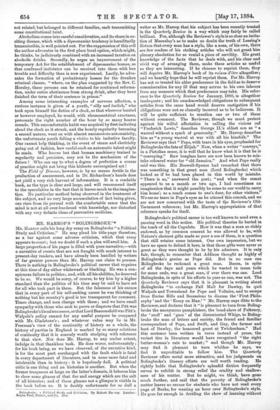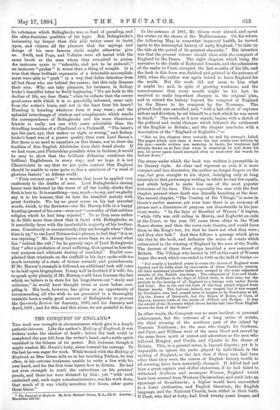MR. HARROP'S " BOLINGBROKE."
Mn. HARROP calls his long dry essay on Bolingbroke "a Political Study and Criticism." He may plead his title-page therefore, as a bar against some adverse criticism, which that essay appears to court; but we doubt if such a plea will avail him. A large proportion of his pages is filled with pure narrative,—with a narrative of events that are not fraught with much interest to present-day readers, and have already been handled by writers of far greater powers than Mr. Harrop can claim to possess. There is nothing in Bolingbroke's political career that requires at this time of day either whitewash or blacking. He was a con- spicuous failure in politics; and, with all his abilities, he deserved to be so. We would be sorry, of course, to try him by a higher standard than the politics of his time may be said to have set for all who took part in them. But the falseness of his excuse that in every part of his self-seeking career he was thinking of nothing but his country's good is too transparent for comment. Times change, and men change with them; and we have small sympathy with thOse who seek to prove or disprove that Pitt was Bolingbroke's lineal successor, or that Lord Beaconsfield was Pitt's. Walpole's policy cannot for any useful purpose be compared with Mr. Gladstone's ; and whatever value may lie in Mr. Freeman's view of the continuity of history as a whole, the history of parties in England is marked by so many solutions of continuity that it is scarcely worth studying with reference to that view. Nor does Mr. Harrop, to any undue extent, indulge in that thankless task. He does worse, unfortunately ; for his book being, as we have observed, of the narrative kind, is for the most part surcharged with the fault which is fatal in every department of literature, and in none more fatal and intolerable than in history : it is hopelessly dull. A political critic is one thing and an historian is another. But when the former trespasses at large on the latter's domain, it behoves him to show some gleams of that fire and energy which are the salt of all histories; and of these gleams not a glimpse is visible in the book before us. It is doubly unfortunate for so dull a
Bolingbroke: a PoRtital &oda and Criticitm. By Robert Ha* rop. London : Kevin Paul, TreneF, and Co. 1884.
writer as Mr. Harrop that his subject has been recently treated in the Quarterly Review in a way which may fairly be called brilliant. For, although the Reviewer's style is so close an imita- tion of Macaulay's as to make us doubt the truth of Lessing's dictum that every man has a style, like a nose, of his own, there are few readers of his striking articles who will not grant him plenary absolution for so venial a piece of servility. His great knowledge of the facts that he deals with, and his clear and vivid way of arranging them, make these articles as useful as they are interesting. If he chooses to reprint them, they will deprive Mr. Harrop's book of its raison d'être altogether; and we heartily hope that he will reprint them. For Mr. Harrop has not so treated his abler predecessor in the field as to deserve commiseration for any ill that may accrue to his own labours from any measure which that predecessor may take. His refer- ence to the Quarterly Review for January, 1880, is altogether inadequate ; and his unacknowledged obligations to subsequent articles from the same hand would deserve castigation if his obligations were not so clumsily incurred as to be ludicrous. It will be quite sufficient to mention one or two of these without comment. The Reviewer, though we must protest against his wilful affectation in calling the vicious oaf "Frederick Lewis," describes George IL's eldest eon as "a wastrel without a spark of generosity." Mr. Harrop describes him as "a young wastrel at war with all his kinsfolk." The Reviewer says that "Pope, with tears in his eyes, prophesied for Bolingbroke the fate of Elijah." Now, when a writer "conveys," in a Pistolian sense, it is well that he know what it is that he is "conveying." Raw burglars have ere now been known to mis- take coloured water for "old Jamaica." And what Pope really said was this. His Boswell-Spence had remarked that there was something in that great man (Lord Bolingbroke) which looked as if he had been placed in this world by mistake. "There is so," answered the poet; "and when the comet appeared to us a month or two ago, I had sometimes an imagination that it might possibly be come to our world to carry him home; as a coach comes to one's door, for other visitors.', We see no tears in Pope's eyes as he uttered this conceit, and we are not now concerned with the taste of the Reviewer's Old- Testament reference; but Mr. Harrop's appropriation of that reference speaks for itself.
Bolingbroke's political career is too well known to need even a passing word in this notice. His political theories lie buried in the tomb of all the Capulets. How it was that a man so richly endowed, as by common consent he was allowed to be, with Nature's choicest gifts made so poor a use of them, is a question that still retains some interest. Our own impression, but we have no space to defend it here, is that those gifts were never so great as they were thought to be by his admirers. It is only fair, though, to remember that Addison thought as highly of Bolingbroke's genius as Pope did. But in no case can Bolingbroke be reckoned a great man. Bacon, in spite of all the days and years which he wasted in mean toils for mean ends, was a great man, if ever there was one. Lord Bolingbroke, in spite of his efforts to pose as one, was not. The Quarterly Reviewer says that it is pleasant in writing about Bolingbroke "to exchange Pill Mall for Dawley, to quit Walpole and Townshend for Pope and Voltaire, and to escape from Excise Bills and Secessions to discuss the First Philo- sophy 'and the ` Essay on Man.'" Mr. Harrop says ditto to the Reviewer, and declares that it "is pleasant to turn from Boling- broke the anonymous pamphleteer, the bond-slave of Pulteney, the ` scoff ' and ` gaze ' of the discontented Whigs, to Boling- broke the man of letters and society, the friend and familiar correspondent of Pope, and Swift, and Gay, the farmer and host of Dawley, the honoured guest at Twickenham." Had this sentence been written in verse instead of prose, the veriest tiro in literature would have recognised "the right butter-woman's rate to market ; " and though Mr. Harrop may find it pleasant to turn whither he says, we find it unprofitable to follow him. The Quarterly Reviewer offers metal more attractive, and his judgments on Bolingbroke's literary efforts are well worth reading. He rightly holds that Bolingbroke's splendid diction frequently serves to exhibit in strong relief the crudity and shallow- ness of his matter. But he might, we think, have gone much further, and said that the poverty of Bolingbroke's matter leaves no excuse for students who have not read every page of Burke, for wasting an hour over Bolingbroke's style. He goes far enough in deriding the show of learning without
its substance which Bolingbroke was so fond of parading, and the ultra-feminine qualities of his logic. But Bolingbroke's insincerity lay deeper than this able writer cares to insist upon, and -vitiates all the pleasure that the sayings and doings of his once famous circle might otherwise give us. Swift, and Pope, and Voltaire were all tarred with the same brush as the man whom they conspired to praise. An insincere cynic is "tolerable, and not to be endured ;" an insincere "gusher" is worse than a thing of nought. It is true that these brilliant exponents of a detestable accomplish- ment were able to " gush " in a way that defies detection from all but those who are behind the scenes; but this only deepens their sins. Who can take pleasure, for instance, in Boling- broke's beautiful letter to Swift beginning, "We are both in the decline of life, my dear Dean," when he reflects that the serene good-sense with which it is so gracefully informed, came only from the writer's brain, and not in the least from his heart? Humbug is humbug whatever form it may wear; and the splendid interchange of wisdom and compliments which marks the correspondence of Bolingbroke and his more illustrious friends -is really not one whit more admirable than the drivelling inanities of a Chadband or a Pecksniff. "The heart's aye the part., aye, that makes-us right or wrong," and Boling- broke's heart was of a poorer quality than even Lord Bacon's. But there is no need to expatiate on this theme, nor to draw the frailties of this English Alcibiades from their dread abode. If we had room, and Platarchian parallels were in fashion, it would be easy to show that the brilliant Athenian outshines the brilliant Englishman in every way ; and we hope it is not Chauvinistic to say that we are quite content that England should be unable to raise quite so fine a specimen of "a weed of glorious feature" as Athens could.
"Finis coronat opus" is a maxim that must be applied very cautiously to the deaths of men. Lord Bolingbroke's closing hours were darkened by the worst of all the bodily shocks that flesh is heir to. It is something—nay, much—to say, and we gladly say it to his honour, that he bore his dreadful malady with great fortitude. We lay no great stress on his last recorded words, which, to the Reviewer—for Mr. Harrop kills in a happy hunting-ground of his own—seem not "unworthy of that sublime religion which he had long rejected." To us they seem rather to do little more than show that it fared with Bolingbroke, as it mercifully fares with the incalculable majority of his brother- men. Consciously or unconsciously, they are brought when "their time is up," to use Lord Palmerston's phrase, to feel that "it is no use repining." Mr. Harrop knows more than we do about what lies " behind.the veil ;" for he gravely says of Lord Bolingbroke that "after a probation of cruel suffering, God opened to him the real purpose and ultimate destiny of mankind." Hazlitt com- plained that criminals on the scaffold in his days spoke with too much certainty of a state of future rewards and punishments. If Mr. Harrop's example is followed, an additional task will come to be laid upon biographers. It may well be doubted if it will; for, to speak quite plainly, if Mr. Harrop could have foreseen the fate which we believe is in store for his long-drawn-out "study and criticism," he would have thought twice or more before com- piling it. His book, however, has given us an opportunity of recommending all who wish to see presented in a thoroughly readable form a really good account of Bolingbroke to procure the Qum-telly Review for January, 1880, and for January and April,1881 ; and for this, and this alone, we are grateful to him.



































 Previous page
Previous page